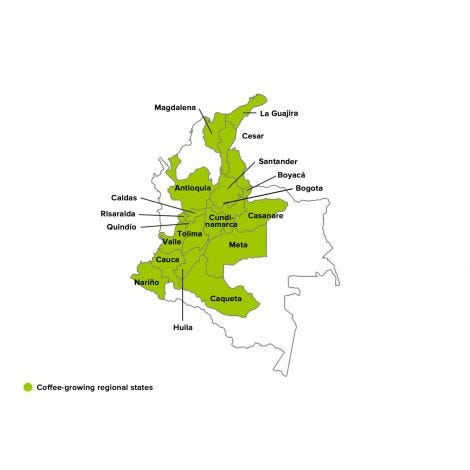Also of Interest
Colombia Huila Decaf
About This Coffee
Blend Huila Decaf contains coffees from the municipalities of Acevedo, Algeciras, Neiva, Oporapa, Palermo, Palestina, Pitalito and Tello—therefore this blend represents some of the very best coffee from across the entire department of Huila, from Tello, Neiva and Palermo in the north, all the way to Palestina, Pitalito and Acevedo in the south, and of
course passing through Oporapa on the way. These municipalities are home to experienced coffee growers, who in the last couple decades have greatly increased their production of specialty coffee, putting Huila on the map as the region with the highest coffee production by volume in Colombia and gaining Denomination of Origin.
The blend is made up of beans from Bourbon, Castillo, Caturra, Colombia, Maragogipe and Tabi trees, hand-selected on several different fincas. These varietals grew on slopping green hillsides, that sit at 1,500 m.a.s.l and ascend all the way up to 1,950 m.a.s.l.
All of Azahar’s decaf coffees are decaffeinated at the Descafecol plant in the city of Manizales. The decaffeination process utilized by Descafecol is a solvent-based process meaning that the caffeine is removed from the coffee beans using a solvent. The decaffeination agent we use is called ethyl acetate (also known as ethyl alcohol) and is derived from a mix of acetic acid (vinegar) and a natural extract distilled from sugar cane, blackberries, beets or sometimes grapes. We use a direct-solvent process meaning that first the beans are steamed to open their pores and are then rinsed in ethyl acetate repeatedly to remove the caffeine. Next the beans are dried but not completely, 10- 12% humidity remains, and then the open bean is sealed with natural wax that in no way affects the flavor, fragrance or aroma of the coffee.
Before undergoing this process, the beans were treated to the beneficio, or post-collection processing. After the cherries were carefully hand-selected for peak ripeness, they were brought in from the field, and left intact for anywhere from twelve to 24 hours, before being de-pulped, and fermented in tanks for 18 to 60 hours. The coffee was then washed, and put on to dry on several different drying systems (raised beds, parabolic greenhouses and mechanical dryers or silos) for eleven to 20 days. The resulting cup has notes of dried red fruits, cashews, panela, chocolate and blackberries.
- Cup Score 83.75
- Producer Type Small Holder Farmers
- Processing Washed
- Bag Type Grain Pro / Ecotact
- Plant Species Arabica
- Variety Bourbon, Castillo, Caturra, Colombia, Maragogype, Tabi
- On Sale No
- Top Lot No
- Status Spot
- Coffee Grade COL CA WA EXCO EP10
- CTRM Contract Number P605918-1
- Ctrm Region Huila
- Country of Origin Colombia
- Warehouse Continental NJ





